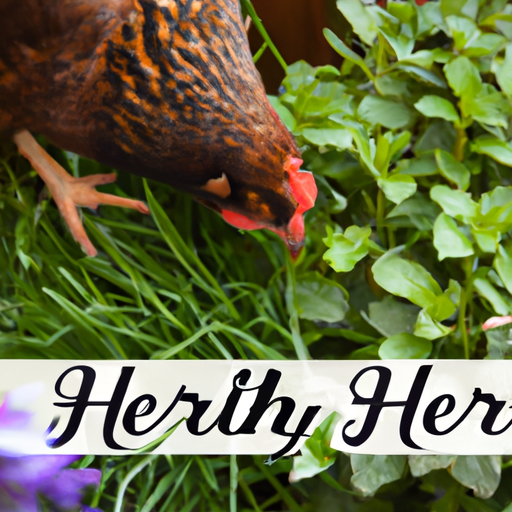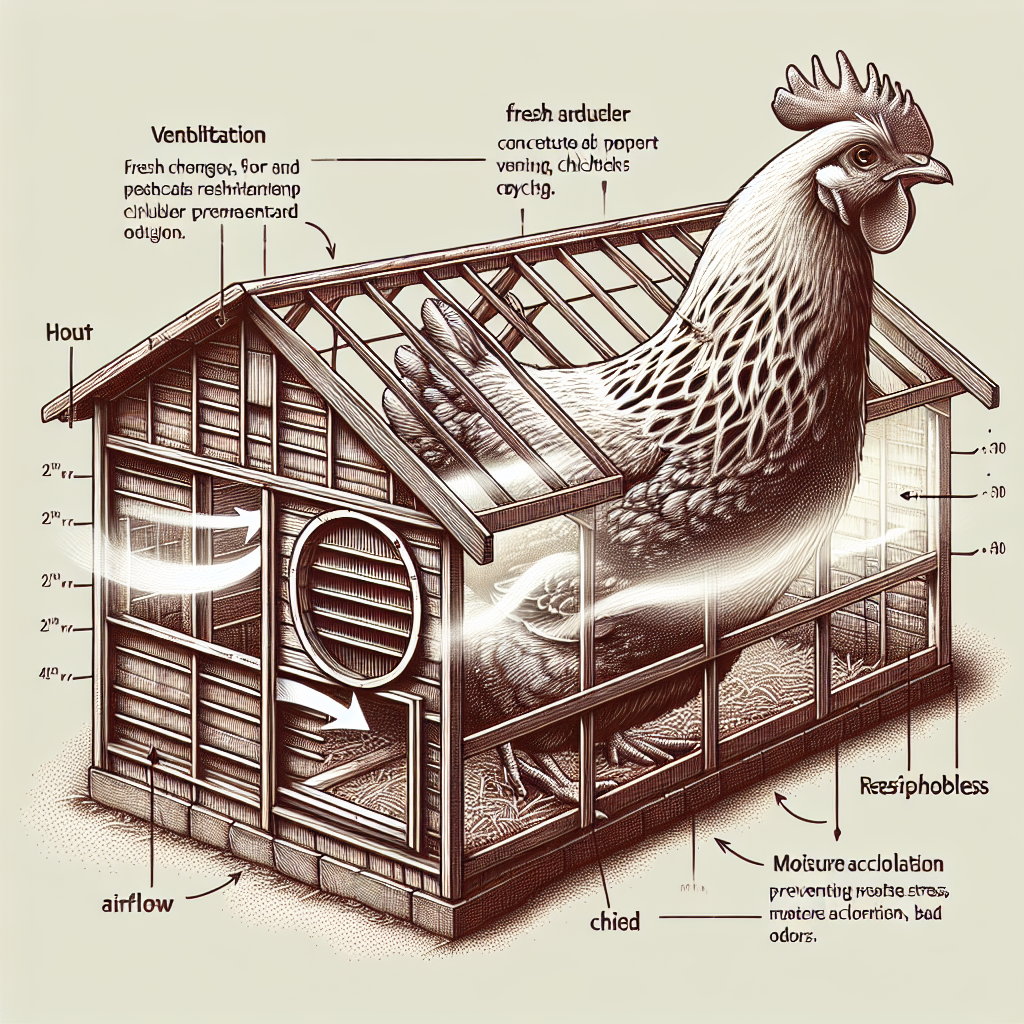If you’re a chicken owner looking for natural ways to support the health of your flock, this article is here to help. We’ll explore a variety of natural remedies and methods that can be used to keep your chickens happy and thriving. From herbal supplements to homemade concoctions, we’ll provide you with practical tips and recommendations to ensure your feathered friends are in the best of health. So, whether you’re a seasoned chicken enthusiast or new to the world of backyard poultry, read on to discover how you can promote the well-being of your chickens naturally.
Nutrition
Balanced diet
A balanced diet is essential for the overall health and well-being of your chickens. Just like humans, chickens need a variety of nutrients to thrive. Make sure to provide them with a good mix of grains, seeds, vegetables, and protein sources such as legumes or mealworms. Additionally, it’s important to offer them a calcium source like crushed oyster shells, as this helps in eggshell formation and prevents calcium deficiency.
Supplements
While a balanced diet should provide chickens with most of their nutritional needs, sometimes additional supplementation can be beneficial. Consider adding vitamin and mineral supplements to their feed, especially during times of stress or when they are recovering from an illness. Supplements like poultry electrolytes can also help maintain hydration levels, particularly during hot summer months.
Probiotics
Probiotics are live bacteria or yeasts that promote gut health by supporting the growth of beneficial microorganisms in the digestive system. They can improve digestive function, enhance nutrient absorption, and boost immunity. You can find probiotic supplements specifically formulated for chickens or offer them yogurt, which is a natural source of probiotics.
Herbal Remedies
Garlic
Garlic is a powerful natural remedy with numerous health benefits. It contains compounds that have antimicrobial and immune-boosting properties, making it an excellent addition to your chicken’s diet. Simply crush a few cloves of garlic and mix it into their feed or water. This can help protect against parasites, support digestive health, and strengthen their immune system.
Oregano
Oregano is another herb that offers several health benefits for chickens. It contains essential oils with antimicrobial properties that can help control parasites such as coccidiosis and improve respiratory health. You can either add fresh oregano to their diet or offer them dried oregano mixed with their feed.
Echinacea
Echinacea is a well-known herb that can stimulate the immune system and help chickens fight off infections. It contains compounds called polysaccharides and alkamides, which have immune-boosting properties. Echinacea can be offered in the form of dried herbs or as a supplement, providing support for your chickens’ overall well-being.
Hygiene
Clean coop
Maintaining a clean coop is vital for preventing the spread of diseases and parasites. Regularly clean out their living quarters, removing any feces, old bedding, or spilled feed. Use a non-toxic disinfectant to clean surfaces, and make sure the coop is well-ventilated to keep air circulating and reduce moisture levels.
Dust baths
Chickens naturally engage in dust baths to keep themselves clean and combat parasites. Provide an area in their coop or run where they can take these baths. Fill it with diatomaceous earth or a mix of sand and wood ash, which helps suffocate external parasites like mites and lice. Dust baths not only promote good hygiene but also give chickens an enjoyable activity to engage in.
Apple cider vinegar
Apple cider vinegar is a natural ingredient that can be added to their water to improve hygiene and promote overall health. It has antimicrobial properties that can help prevent the growth of harmful bacteria, fungi, and parasites. Additionally, apple cider vinegar can assist with digestive health and improve nutrient absorption. Add a tablespoon of apple cider vinegar per gallon of water and offer it to your chickens regularly.
Parasite Control
Diatomaceous earth
Diatomaceous earth is a naturally occurring substance made from the fossilized remains of diatoms. It is highly effective in controlling external parasites like mites and lice. Sprinkle diatomaceous earth in and around the coop, particularly in areas where parasites are likely to gather. When parasites come into contact with diatomaceous earth, it damages their exoskeletons, leading to dehydration and death.
Herbal repellents
Some herbs, such as mint, lavender, and thyme, have natural properties that repel pests. Plant these herbs near the coop or include them in their environment, as they can help deter parasites like flies, mosquitoes, and certain mites. Chickens may also enjoy nibbling on these herbs, which can provide additional health benefits.
Regular cleaning
Maintaining a regular cleaning routine is crucial for parasite control. Regularly remove old bedding, clean feeders and waterers, and address any areas where pests may be hiding. By keeping their environment clean and free from debris, you can prevent the buildup of parasites and reduce the risk of infestations.
Stress Reduction
Provide a calm environment
Creating a calm and stress-free environment for your chickens is essential for their overall well-being. Minimize noise and disturbances, such as loud machinery or predators constantly lurking nearby. Make sure the coop is comfortable, with adequate space for each chicken, and provide suitable nesting boxes for them to lay their eggs.
Limit disturbances
While it’s natural to want to check on your chickens regularly, try to limit disturbances as much as possible. Frequent handling or sudden loud noises can cause stress and lead to health issues. Establish a routine where you interact with your chickens at consistent times, and approach them calmly and gently.
Natural supplements
Certain natural supplements can help reduce stress in chickens. Chamomile, for example, has calming properties and can be added to their diet or offered as tea. Valerian root is another herb that can have a calming effect. However, it’s important to consult with a veterinarian before introducing any new supplements to ensure they are safe and appropriate for your chickens.
Immune System Boosters
Vitamin C
Vitamin C is a powerful antioxidant that supports the immune system and can help chickens fight off infections. It plays a crucial role in the production of collagen, which is essential for healthy skin and tissues. Consider adding foods rich in vitamin C, such as fruits and leafy greens, to their diet. You can also provide vitamin C supplements if recommended by a veterinarian.
Elderberry
Elderberry is a natural immune system booster that can help protect chickens from respiratory infections. It contains flavonoids and antioxidants that have antiviral properties. Offer elderberries as a treat or include elderberry extract in their water or feed. However, be cautious not to overfeed, as excessive consumption may have adverse effects.
Turmeric
Turmeric is a vibrant spice that contains a compound called curcumin, known for its anti-inflammatory and immune-boosting properties. Adding a small amount of turmeric to their feed can provide additional support for their immune system. However, consult with a veterinarian to determine the appropriate dosage, as turmeric can stain feathers.
Respiratory Health
Fresh air circulation
Allowing fresh air to circulate in the coop is crucial for maintaining optimal respiratory health. Proper ventilation helps remove moisture, ammonia fumes, and other airborne contaminants that can irritate their respiratory system. Make sure the coop has adequate windows, vents, or openings to allow for good airflow without creating drafts.
Eucalyptus oil inhalation
Eucalyptus oil is a natural remedy that can help clear respiratory passages and provide relief from congestion. You can add a few drops of eucalyptus oil to a diffuser or spray bottle and lightly mist the coop. Alternatively, hang eucalyptus branches in their living area to allow them to inhale the beneficial vapors.
Herbal remedies
Certain herbs, such as thyme and mint, have expectorant properties and can aid in respiratory health. Their aromatic oils can help relieve congestion and reduce inflammation in the respiratory tract. Add these herbs to their diet or offer them as fresh treats to support their respiratory system naturally.
Digestive Support
Probiotics
Probiotics are not only beneficial for immune health but also for digestive health. They help maintain a healthy balance of gut bacteria and improve digestion and nutrient absorption. Consider adding a probiotic supplement to their feed or offering yogurt, which contains natural probiotics. This can help prevent digestive issues and promote overall gut health.
Pumpkin seeds
Pumpkin seeds are a natural way to support digestive health in chickens. They are a good source of fiber and contain essential fatty acids that can help regulate bowel movements and reduce the risk of constipation. Offer them as a treat or grind them into a fine powder and mix it with their feed.
Aloe vera
Aloe vera is a plant with soothing properties that can support the digestive health of chickens. You can offer small amounts of fresh aloe vera gel or mix it with their water. Aloe vera can aid in reducing inflammation and irritation in the digestive tract and promote healing in case of digestive issues.
Wound Care
Honey
Honey is a natural remedy with antimicrobial properties that can help speed up wound healing in chickens. It forms a protective barrier, prevents infection, and promotes tissue regeneration. Apply a small amount of honey directly onto clean wounds or mix it with warm water to create a gentle wound-cleaning solution.
Calendula
Calendula is a medicinal herb known for its skin-healing and anti-inflammatory properties. It can be used topically to treat minor wounds, cuts, or abrasions in chickens. Infuse dried calendula flowers in warm water to create a gentle solution for wound cleaning or apply calendula salve to the affected area.
Tea tree oil
Tea tree oil has antiseptic and antimicrobial properties that can help prevent wound infections and support healing. Dilute tea tree oil with a carrier oil, such as coconut oil, and apply it to clean wounds. Be cautious to use a very small amount and monitor your chickens for any adverse reactions.
Prevention of Disease
Vaccination
Vaccination is a crucial preventive measure to protect chickens from diseases. Consult with a veterinarian to determine which vaccines are appropriate for your flock based on the prevalent diseases in your area. Vaccines can help reduce the risk of serious illnesses and provide long-term protection for your chickens.
Quarantine procedures
Implementing strict quarantine procedures when introducing new chickens to your flock is essential to prevent the spread of diseases. Quarantine new birds for a period of at least two weeks, keeping them separate from your existing flock. This allows time to observe for any signs of illness and ensures that the new birds are healthy before introducing them to the rest of your flock.
Biosecurity measures
Maintaining good biosecurity practices is crucial for disease prevention. This includes regularly cleaning and disinfecting the coop and equipment, limiting access of wild birds and rodents to the coop area, and practicing proper hygiene when handling chickens. Minimizing contact with other flocks and avoiding areas with known disease outbreaks can also help reduce the risk of disease transmission.




